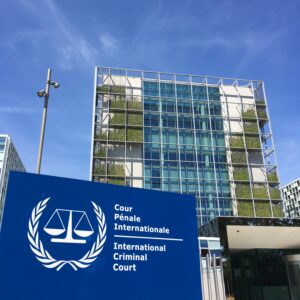
On May 20, 2024 International Criminal Court (ICC) prosecutor, Karim Khan, applied for arrest warrants for Israeli Prime Minister Benjamin Netanyahu, his defense minister Yoav Gallant and three Hamas leaders for war crimes. The move marks the first time that the ICC has issued an arrest warrant for a leader who is a close ally of the United States. As the world looks to end the humanitarian crisis in Gaza with a permanent ceasefire, the ICC has found its role in documenting and prosecuting atrocities committed by both Israeli and Hamas forces. While the ICC does not have any actual jurisdiction to arrest those implicated in its warrants, the Court has positioned itself to surmount real international pressure and momentum against Israel’s continued war campaign in the Gaza Strip.
International leaders who have allied with Israel have expressed their outrage at Khan’s decision to bring the arrest warrants against Netanyahu and Gallant. President Biden responded after news of the decision by saying, “Let me be clear: Whatever this prosecutor might imply, there is no equivalence — none — between Israel and Hamas.”
While the timing and political nature of the arrest warrants might be overblown by Western leaders who fear growing diplomatic isolation for Israel, the decision to pursue the arrest warrants by Khan is justified by compelling evidence. The arrest warrants mainly focus on violations of articles seven and eight of the Rome Statute, the landmark 2002 war crimes treaty. The charges against Netanyahu and Gallant include “starvation as a method of warfare” and “wilful killing” among five other charges. The Hamas leaders face charges of “murder,” “taking hostages” and “rape and other acts of sexual violence” that are mostly in reference to the Oct. 7 Hamas attacks.
Critics of the ICC routinely highlight the Court’s lack of jurisdiction in enforcing its rulings or arrest warrants. The functional basis for having the ICC as an international body is to prosecute individuals who have committed war crimes or “crimes against humanity” when national judicial systems are unable or unwilling to do so. In a world where international organizations have no power to enforce their decisions, the ICC’s role is broader as it is meant to put international pressure on states who refuse to abide by its decisions.
While major players in the current humanitarian crisis, like the United States and Israel, are not parties to the ICC, Khan has put countries like the United Kingdom and Germany in a bind. As parties to the ICC, they would be obligated to arrest Netanyahu or Gallant should they travel to these countries after ICC approval of the arrest warrants. This makes future diplomacy complicated for the West and might spark pressure from these countries to urge the ousting of Netanyahu to preserve their relations with Israel.
These arrest warrants are important in surmounting this international pressure and asserting the impartiality of the ICC. In its brief history, the ICC has only ever convicted 10 war criminals under the Rome Statute, all of them from Africa. Thus, many countries blame the ICC as being a tool of the West to only prosecute African war criminals while ignoring other war crimes committed by the West. Khan’s application for the arrest warrants of Netanyahu and Gallant is crucial because it shows that the ICC is an impartial actor.
While genocide is not one of the charges brought against Netanyahu, these arrest warrants and the collection of evidence could be important in future ICC or International Court of Justice (ICJ) cases to prove that Israel’s atrocities have amounted to genocide. Despite the obstacles to enforcing compliance with the arrest warrants, the ICC is fulfilling a pivotal role in shedding light on the atrocities happening in the Gaza Strip and formalizing the world’s calls for justice.







